by Von Frank Bosse & F. Vahrenholt, January 30, 2019 in WUWT
Our sun was also very sub-normally active in December last year. We are writing the 121st month since the beginning of cycle number 24, in December 2008, and since 2012 (when we started the blog here) we could only reformulate the opening sentence once: In September 2017 when the sun was 13% more active than the long-term (since 1755) average.
All other months were below average. With the sunspot number (SSN) of 3.1 for the monthly average for December and a total of 24 days without any spot (throughout the second half of the month the sun was spotless) we are in the middle of the cycle minimum.
…

Fig. 2: The sunspot activity of our sun since cycle 1 (1755). The numbers are calculated by adding the monthly differences with respect to the mean (blue in Fig.1) up to the current cycle month 121.
.
by Samuel Furfari, 29 janvier 2019 in Contrepoints
La révolution bolivarienne financée par le pétrole a complètement appauvri le Venezuela. Les idéologues socialistes avaient tout faux depuis le début.
…
Le paradoxe est encore plus étrange car le pays est très riche en ressources naturelles. Avec 303 milliards de barils (18 % du total mondial), le Venezuela détient les plus grandes réserves prouvées de brut au monde, loin devant l’Arabie Saoudite qui en possède 266. Pour mesurer leur ampleurs, observons que ces réserves correspondent à celles combinées de la Russie, des États-Unis et de l’Iran. Il possède également 6 400 milliards de m3 de gaz naturel – 3,3 % des réserves mondiales – soit près de quatre fois les réserves de la Norvège, considérée en Europe comme un grand du gaz.
La plupart des réserves de pétrole prouvées du Venezuela sont situées dans le bassin du fleuve Orinoco, où 220,5 milliards de barils de pétrole lourd gisent, pratiquement inexploités. Même s’il n’est pas de première qualité, c’est quand même du pétrole. La principale zone de production se trouve dans le bassin de Maracaibo, où l’on pompe près de 50 % du pétrole vénézuélien.
…
by Eric Worrall, January 29, 2019 in WUWT
A message to French Yellow Vests that greens and EU supporters can field large groups of demonstrators. But half the pro-climate action marchers were school children.
I’m disgusted by how greens seem to think it is OK to use children as political pawns in their nasty game.
The school children, half of the climate action marchers, have no idea about the real world. They have never experienced the misery of watching their meagre weekly pay packets taxed away by distant green politicians who have no empathy or concern for the problems of ordinary people.

La géologie, une science plus que passionnante … et diverse


